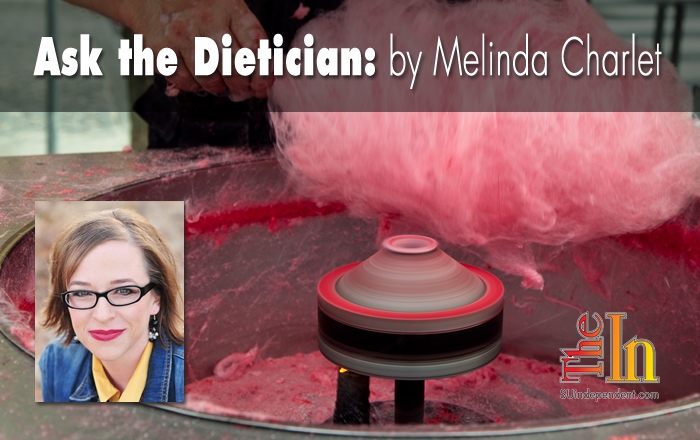Dear Dietician,
Concerned parent
Dear Concerned parent,
As a mother of four growing children, I am also concerned about the amount of sugar my kids consume, but for different reasons than you might think. A sugary treat every now and then isn’t horrible in terms of the overall picture of your child’s health. But you can see how a candy bar for returning homework, skittles during a math assignment, a doughnut party for a class contest, and a cupcake for Johnny’s birthday could add up to an unhealthy amount of sugar pretty fast. The more junk food a child eats, the less room they have for the nutritious foods that they need in order to grow. Too much sugar can also put them at risk for obesity and Type 2 diabetes, as well as cavities.
But I am more concerned about the fact that sugar is being used as a reward than the amount of sugar. When sugar is used as a reward, children learn to associate feeling happy and accomplished with sugar. This can lead to an unhealthy relationship with food later on. If you are taught as a child to relate feeling happy with eating sugar, when you are feeling sad and want to feel happy, you will reach for sugar to help provide those feelings. Have you ever had a stressful day at work and decided to reward yourself with ice cream on your way home because “you deserved it?” Where do you think you learned that?
Likewise, we shouldn’t use food to distract our children from uncomfortable feelings. If a child is hurt or sick or bored, sometimes our first instinct is to try to get their mind off of their problems by giving them a sucker or ice cream cone. But this only teaches them to suppress bad feelings with food. Instead, help them talk about what’s bothering them, and give them a hug or kiss. Help them understand that it’s okay to feel upset or sad, and that difficult emotions are a regular and normal part of life.
Rewards do have their place, but there are many things that can be used as a reward that are not food-based. These can be used at home, and also suggested to teachers. Stickers, extra recess time, or doing a favorite activity, such as going to the park or reading a story, are just a few examples. Don’t forget how powerful simple words of praise can be. Find out what motivates your child, and use that as their currency. Talk to your child’s teacher and express your concerns about sugar being used as rewards in the classroom, and offer some suggestions for alternatives that could be used instead. I’m sure they would appreciate your input.
Another important thing to realize is that not every single sports or school activity needs to have a reward attached to it. If a child a rewarded for every accomplishment, they will learn to only complete tasks well enough to get the reward and when the reward is taken away, the behavior will stop. Help your children recognize the self-satisfaction that comes naturally from doing a good job. This will help prepare them for adulthood, because last time I checked, there weren’t people handing out candy because I got to work on time or paid my bills.
I am not saying that you should totally eliminate sweets from your child’s life. Food in all of its forms can play an important and legitimate part in celebrating and enjoying life. But instead of sugar being used as a reward several times a day, chose to have a favorite treat a few times a week as a regular part of meals or snacks. This will teach children the healthy habit of including high-calorie foods occasionally in an otherwise balanced diet. This will also help break the harmful connection between sugar and rewards.
Healthy wishes,
Melinda the Dietician




